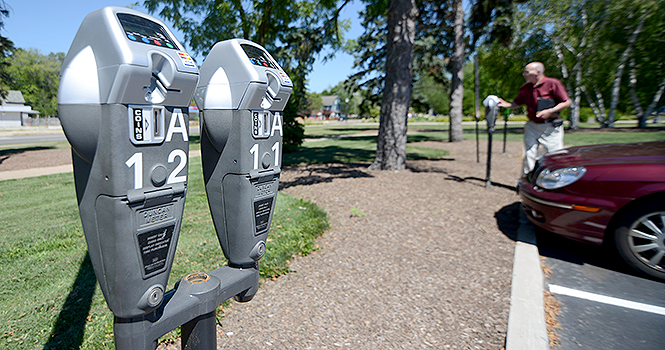Kent State implements new parking meter technology
Kent State University installed 300 parking meters across campus, upgrading the current meters which were about 15 years old. Most of the new meters will now accept credit cards in addition to change. Photo by Matt Hafley.
August 8, 2012
Parking Services recently upgraded 300 parking meters — enabling visitors to pay by credit card — and increased parking rates for the first time since 1999.
The department purchased 320 new parking meters in May from IPS Group Inc., a manufacturer of wireless parking technology, after accepting the firm’s bid to install the machines, said Larry Emling, manager for Parking Services.
The remaining 20 meters are being stored as backups for future use, Emling said. The new meters offer users the option to pay by credit card but will also continue to accept coin payments.
Emling said the updated parking meters have replaced old machines in parking lots all throughout campus. The cost has increased from 50 cents an hour to $1.00 an hour. He noted university meter prices have been well under the prevailing market rate for quite some time and that many competitors are charging $1.50 an hour.
Emling said upgrading the meters on campus is a project that has been planned for several years. He said the outdated machines are at least 15 years old, and with plans to raise rates already in place, Parking Services wanted to provide more convenient technology to students and visitors.
“With increasing rates, it made sense that we allow credit cards as an option for payment, so that if people weren’t carrying coins with them it would give them another payment option,” Emling said. “So it’s more of a service convenience we’re providing to whoever is using the meters.”
The 20-minute and 30-minute meters were not updated with the new credit card option because it would not be cost effective to install the technology on such inexpensive machines, he said. However, time limits and prices were adjusted to deter students from occupying these spaces for long periods of time during classes rather than buying parking passes, Emling said.
“We want to encourage turnover and keep meters for short-term,” Emling said of the maximum two-hour parking limit in most academic areas. However, he said the four-hour limit in residence hall areas is possibly being extended to eight hours for visitors’ convenience.
Miranda Cogar, a junior pre-nursing student, said she thinks “it’s convenient to use credit cards” but is not happy with the price increases.
Emling explained the meters are being retrofitted as opposed to being completely replaced.
“That was part of the selling feature to us, that we could still use part of our existing equipment and minimize our expenses,” he said of the updated meters, which cost $500 each.
Emling said the pieces that were replaced will be disposed of if they no longer work. The other working pieces may be auctioned off.
The new meters offer online access, which allows Parking Services to view real-time information from the meters. Employees can monitor which meters are active, when money was inserted into the machines and whether machines are expired.
Parking Services has approximately 5 to 10 workers monitoring campus parking lots, which results in the issuing of about 48,000 tickets per year, according to Emling, who said he hopes providing another payment option will cut down on parking tickets.
Contact Amanda Crumm at [email protected].

























